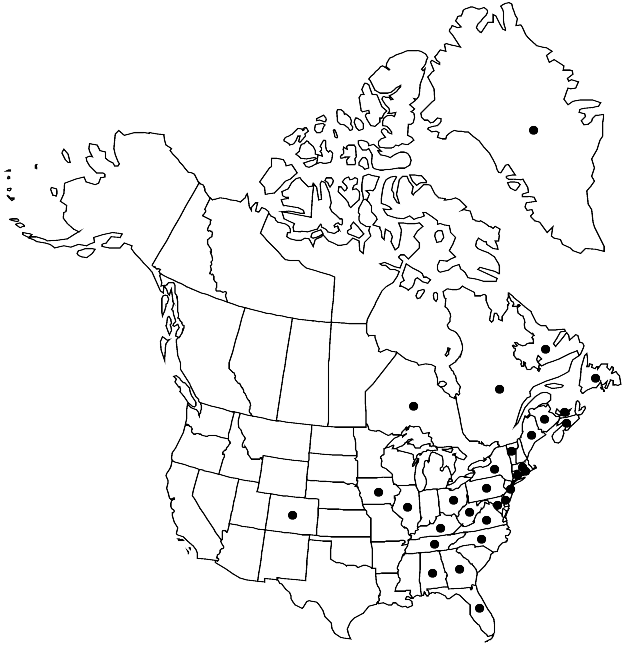Difference between revisions of "Mnium hornum"
Sp. Musc. Frond., 188. 1801.
FNA>Volume Importer |
FNA>Volume Importer |
||
| Line 23: | Line 23: | ||
|elevation=low to moderate elevations | |elevation=low to moderate elevations | ||
|distribution=Greenland;N.B.;Nfld. and Labr.;N.S.;Ont.;P.E.I.;Que.;Ala.;Colo.;Conn.;Del.;Fla.;Ga.;Ill.;Iowa;Ky.;Maine;Md.;Mass.;N.J.;N.Y.;N.C.;Ohio;Pa.;R.I.;Tenn.;Vt.;Va.;W.Va.;South America;Europe;Asia;Africa. | |distribution=Greenland;N.B.;Nfld. and Labr.;N.S.;Ont.;P.E.I.;Que.;Ala.;Colo.;Conn.;Del.;Fla.;Ga.;Ill.;Iowa;Ky.;Maine;Md.;Mass.;N.J.;N.Y.;N.C.;Ohio;Pa.;R.I.;Tenn.;Vt.;Va.;W.Va.;South America;Europe;Asia;Africa. | ||
| − | |discussion=<p>Mnium hornum is one of the most distinctive members of the genus. The long, narrow leaves and strongly toothed abaxial costae with teeth of 1(–3) cells are diagnostic.</p> | + | |discussion=<p><i>Mnium hornum</i> is one of the most distinctive members of the genus. The long, narrow leaves and strongly toothed abaxial costae with teeth of 1(–3) cells are diagnostic.</p> |
|tables= | |tables= | ||
|references= | |references= | ||
| Line 47: | Line 47: | ||
|publication year=1801 | |publication year=1801 | ||
|special status= | |special status= | ||
| − | |source xml=https://jpend@bitbucket.org/aafc-mbb/fna-data-curation.git/src/ | + | |source xml=https://jpend@bitbucket.org/aafc-mbb/fna-data-curation.git/src/8f726806613d60c220dc4493de13607dd3150896/coarse_grained_fna_xml/V28/V28_358.xml |
|genus=Mnium | |genus=Mnium | ||
|species=Mnium hornum | |species=Mnium hornum | ||
Revision as of 17:04, 18 September 2019
Plants 1.5–5(–8) cm. Stems red or brown. Leaves green, yellowish, or occasionally dark green, slightly contorted, usually coiled and twisted when dry, sometimes to one side of stem, narrowly elliptic, narrowly ovate-elliptic, or ovate-lanceolate, 3–6 mm, proximal stem leaves narrowly triangular; base short-decurrent; margins pale brown, 2-stratose, toothed to below mid leaf, sometimes to near base, teeth paired, large, sharp; apex acute or acuminate, apiculate or cuspidate, cusp sometimes toothed; costa ending well below apex or occasionally percurrent, distal abaxial surface strongly toothed, adaxial surface occasionally toothed; medial laminal cells ± isodiametric or short-elongate, (15–)17–26(–30) µm, slightly smaller towards margins, not in diagonal rows, sometimes in longitudinal rows, not or weakly collenchymatous, blue postmortal color absent; marginal cells linear, in (2–)3–4 rows. Sexual condition dioicous. Seta single. Capsule pale brown, 3–5 mm; operculum conic-mammillate, rarely short-rostrate; exostome yellowish brown. Spores 30–35 µm.
Phenology: Capsules mature summer.
Habitat: Banks along streams, shorelines, cliff faces on moist, sandy soil, humus
Elevation: low to moderate elevations
Distribution

Greenland, N.B., Nfld. and Labr., N.S., Ont., P.E.I., Que., Ala., Colo., Conn., Del., Fla., Ga., Ill., Iowa, Ky., Maine, Md., Mass., N.J., N.Y., N.C., Ohio, Pa., R.I., Tenn., Vt., Va., W.Va., South America, Europe, Asia, Africa.
Discussion
Mnium hornum is one of the most distinctive members of the genus. The long, narrow leaves and strongly toothed abaxial costae with teeth of 1(–3) cells are diagnostic.
Selected References
None.